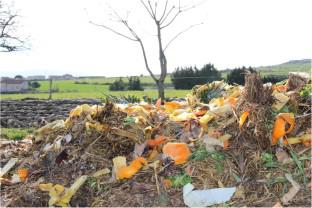Agronomy for Sustainable Development ( IF 7.3 ) Pub Date : 2022-08-31 , DOI: 10.1007/s13593-022-00819-y Vincent Ducasse , Yvan Capowiez , Joséphine Peigné

|
Continued population growth and urbanization as well as changing consumption patterns have led to an explosion in the amount of waste produced, especially in cities. To feed the world, we also need to increase agricultural production while limiting our impact on the environment. Part of the solution could be to recycle the organic fraction of municipal solid waste (OFMSW) as a resource for agriculture near cities with techniques such as vermicomposting, which uses earthworms to recycle organic waste into nutrient-rich vermicompost. The objective of this review was to examine (i) whether vermicomposting is appropriate for recycling OFMSW, (ii) the quality of the vermicompost produced, and (iii) the impact of this product on crops and soil parameters. We found that vermicomposting can be adapted for OFMSW recovery because the process is suitable for all the types of OFMSW (food, paper, and green waste). The vermicompost produced is both high in organic carbon (18.83-36.01%) and a potential fertilizer (1.16-2.58% N, 0.42-1.12% P, and 0.61-2.05% K). A comparison with compost from the same types of OFMSW suggested that vermicompost is slightly more suitable for crop production with significantly lower C/N and pH and higher N and P. Vermicompost was actually found to have a better effect on plant growth than compost, suggesting that classical chemical analyses are not always sufficient to characterize the potential of organic amendments/fertilizers. Indeed, the application of vermicompost in the field leads to an increase in carbon storage, water retention, enzymatic and microbiological activity, and soil fauna abundance and diversity. Finally, we found that reports on the use of vermicompost from OFMSW are scarce and most studies focused on the process itself. Overall, our review synthesizes data and the interest in this technique and proposes perspectives for future studies.
中文翻译:

城市固体废物的蚯蚓堆肥作为可持续农业发展的一个可能杠杆。回顾
持续的人口增长和城市化以及不断变化的消费模式导致垃圾产生量激增,尤其是在城市。为了养活世界,我们还需要增加农业产量,同时限制我们对环境的影响。部分解决方案可能是利用蚯蚓堆肥等技术回收城市固体废物 (OFMSW) 的有机部分作为农业资源,利用蚯蚓将有机废物回收成营养丰富的蚯蚓堆肥。本次审查的目的是检查 (i) 蚯蚓堆肥是否适合回收 OFMSW,(ii) 生产的蚯蚓堆肥的质量,以及 (iii) 该产品对作物和土壤参数的影响。我们发现蚯蚓堆肥可以适用于 OFMSW 回收,因为该过程适用于所有类型的 OFMSW(食品、纸张和绿色废物)。生产的蚯蚓堆肥有机碳含量高(18.83-36.01%)和潜在的肥料(1.16-2.58% N、0.42-1.12% P 和 0.61-2.05% K)。与来自同类型 OFMSW 的堆肥的比较表明,蚯蚓堆肥更适合作物生产,其 C/N 和 pH 值显着降低,而 N 和 P 较高。实际上发现蚯蚓堆肥比堆肥对植物生长的影响更好,这表明经典的化学分析并不总是足以表征有机改良剂/肥料的潜力。事实上,蚯蚓堆肥在田间的应用导致碳储存、保水、酶和微生物活性的增加,和土壤动物的丰度和多样性。最后,我们发现关于使用 OFMSW 蚯蚓粪的报道很少,大多数研究都集中在该过程本身。总体而言,我们的审查综合了数据和对该技术的兴趣,并为未来的研究提出了展望。


























 京公网安备 11010802027423号
京公网安备 11010802027423号